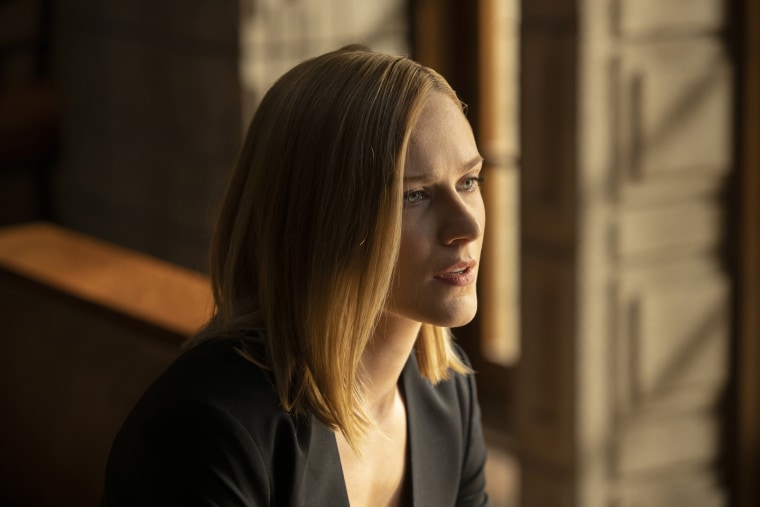“Westworld” is one of TV’s most frustrating series. The prestige drama, based on the 1973 film of the same name, veers from an extraordinarily pointed critique of today’s technology to a never-ending nesting doll of interwoven timelines and puzzlebox storytelling, more impressed with its own cleverness than telling a clear story. Season 1 got lost in endless harrowing narrative twists. Season 2 started off with a set of episodes that suggests the series had taken complaints about too much complexity to heart, but by the time the ten-episode run was over, it had lapsed back into non-linear storytelling for its own sake, ending with a nearly 90-minute finale that lost all sense of the show’s message.
Season 3, which began on March 15 and now has aired three episodes of a planned eight, once again seems like it is trying to curtail the cleverness.
Season 3, which began on March 15 and now has aired three episodes of a planned eight, once again seems like it is trying to curtail the cleverness. And there are reasons to believe that it may have, especially with Sunday night’s installment, “The Absence of Field.” For the time being, the series has stopped trying to yank the rug out from under our feet and does something radical: It has two characters sit down across the table from each other and explain the season’s theme. And that theme is mainly a warning of what our future may look like if we as a people don’t start taking our privacy laws seriously.
The premise of the new season rests on the idea that the android hosts are finally starting to escape the park and enter the real world. It’s the angle most assumed the show would eventually take, as the 1973 “Westworld” movie’s sequel, “Futureworld,” imagined a future where world leaders were replaced by the park’s killer robots. So far, the leading rebel android Dolores (Evan Rachel Wood), who escaped the park at the end of Season 2, has not replaced any politicians, or even any leading CEOs, preferring instead to replace those close to power. But this week her rebellion, which in Season 2 remained mostly vague, has sharpened focus. She’s going to start a revolution, and it's going to include humans.
Her first human ally is army vet Caleb (“Breaking Bad’s” Aaron Paul), the show’s main casting addition this season. Paul is known for his “average working class dude” persona, and he deploys it in this future existence with disarming aplomb, spending his days doing construction with a robot buddy, and his nights working petty criminal jobs assigned via an Uber-esque app to make ends meet. He continually tries to move up in the world, but his applications go unanswered or rejected. He is exactly the type of person who has never been to a Westworld park, because such luxuries are unimaginable.
He’s also the perfect example of the show’s main message: companies who run their businesses based solely on user data are dangerous. Showrunners Jonathan Nolan and Lisa Joy take the process to its logical and most pessimistic endpoint. Caleb’s inability to get a job in the year 2052 has nothing to do with his qualifications, his poise, or his ambition. All of his data — every phone call, every doctor’s appointment, every conversation he’s had since he was a child — has been processed using a program known as Rehoboam, and the machine’s algorithms have decided that no matter how hard he works, he can never move up. His medical history, his family history, his time in the army, all of it points to him probably committing suicide in a decade, his life is simply not worth the resources. Rehoboam has even decided they don’t want him to ever be allowed a serious relationship: “Marriage not recommended. Children not allowed.”
These warning about large scale surveillance and companies that function as virtual panopticons have been central to “Westworld” for the last two seasons.
These warning about large scale surveillance and companies that function as virtual panopticons have been central to “Westworld” for the last two seasons, even as those themes wind up drowned out by tangled timelines. But this is the first time the show has sat down and spelled out why it chose these problems — and it does so in the starkest of terms.
There’s no parable here, no fantasy viewers and critics need to parse. It took three seasons, but “Westworld” has stripped the artifice and the games away and made it clear to those watching that we are watching our futures, should we continue to allow a small handful of rich and ambitious men to treat our personal lives as commodities.
Now, it’s quite possible that “Westworld” will throw it all away again. Critics were given four out of this season’s eight episodes ahead of time, and by the end of episode 4, there is at least one twist that suggests the show will never really be able to stop finding ways to trip over itself. But for the time being, “Westworld” is finally firing on all cylinders, and hitting all the right notes. Let’s just hope there’s still an audience willing to tune in and listen.

